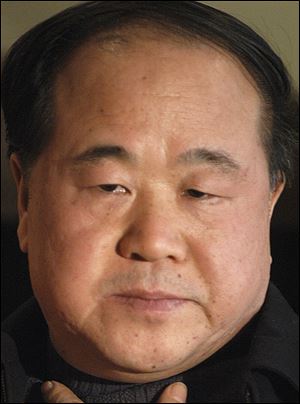
Chinese writer Mo Yan wins Nobel literature prize
10/11/2012
Chinese writer Mo Yan.
STOCKHOLM — Chinese writer Mo Yan won the Nobel Prize in literature on Thursday, a cause of pride for a government that had disowned the only previous Chinese winner of the award, an exiled critic.
National television broke into its newscast to announce the award — exceptional for the tightly scripted broadcast that usually focuses on the doings of Chinese leaders.
The Swedish Academy, which selects the winners of the prestigious award, praised Mo's "hallucinatory realism" saying it "merges folk tales, history and the contemporary."
Peter Englund, the academy's permanent secretary, said the academy had contacted Mo, 57,before the announcement.
"He said he was overjoyed and scared," Englund said.
Among the works highlighted by the Nobel judges were "Red Sorghum, (1993), "The Garlic Ballads" (1995), "Big Breasts & Wide Hips (2004).
"He's written 11 novels and let's say a hundred short stories," Englund said. "If you want to start off to get a sense of how he is writing and also get a sense of the moral core in what he is writing I would recommend 'The Garlic Ballads.'"
The award was almost certain to be welcomed in China, unlike when jailed dissident Liu Xiaobo won the Nobel Peace Prize in 2010, which infuriated China. That was the last time a Chinese national won a Nobel Prize.
The communist leadership also disowned the Nobel when Gao Xingjian won the literature award in 2000 for his absurdist dramas and inventive fiction. Gao's works are laced with criticisms of China's communist government and have been banned in China.
Born Guan Moye in 1955 to a farming family in eastern Shandong province, Mo chose his penname while writing his first novel. Garrulous by nature, Mo has said the name, meaning "don't speak," was intended to remind him to hold his tongue lest he get himself into trouble and to mask his identity since he began writing while serving in the army.
His breakthrough came with novel 'Red Sorghum' published in 1987. Set in a small village, like much of his fiction, 'Red Sorghum' is an earthy tale of love and peasant struggles set against the backdrop of the anti-Japanese war. It was turned into a film that won the top prize at the Berlin International Film Festival in 1988, marked the directing debut of Zhang Yimou and boosted Mo's popularity.
Mo writes of visceral pleasures and existential quandaries and tends to create vivid, mouthy characters. While his early work stuck to a straight-forward narrative structure enlivened by vivid descriptions and raunchy humor, Mo has become more experimental, toying with different narrators and embracing a free-wheeling style often described as 'Chinese magical realism.'
European authors had won four of the past five awards, with last year's prize going to Swedish poet Tomas Transtromer. As with the other Nobel Prizes, the prize is worth 8 million kronor, or about $1.2 million.